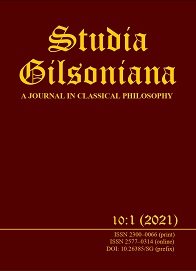Freedom and Religion: A Realistic Correlation
Freedom and Religion: A Realistic Correlation
Author(s): Katarzyna StępieńSubject(s): Philosophy
Published by: International Étienne Gilson Society
Keywords: freedom; religion; human nature; person; religious freedom; human rights; fideism; sentimentalism; individualism; realistic philosophy;
Summary/Abstract: The article points to voluntarism as a tendency in the history of philosophy, which consists in the theoretical justification for the phenomenon of the absolutization of freedom. This phenomenon also occurs in practical life, where freedom is no longer understood as freedom to truth and goodness enjoyed within the limits of natural law, but as negative freedom, i.e., as a space of free choices made without any determination, limitation and coercion (sometimes understood as any external influence on the individual, even cultural or educational), as privacy, or ultimately as complete independence from one’s own nature, from the world and other persons. The absence of natural limitations to human freedom leads to its absolutization and permissiveness, and consequently results in attempts by the state and the law to limit it which, in turn, leads to its negation. However, the conflict between freedom and nature, nature and culture, freedom and law is illusive. The article points out: 1) the essence of human freedom, 2) a synthesis of freedom and religion in the form of the right to religious freedom, and 3) threats to freedom and religion from atheism, fideism, sentimentalism and individualism. What defends against the reductionist account of freedom and religion is a realistic philosophy that indicates the rational and objective character of freedom and religion.
Journal: Studia Gilsoniana
- Issue Year: 10/2021
- Issue No: 1
- Page Range: 181-205
- Page Count: 25
- Language: English

